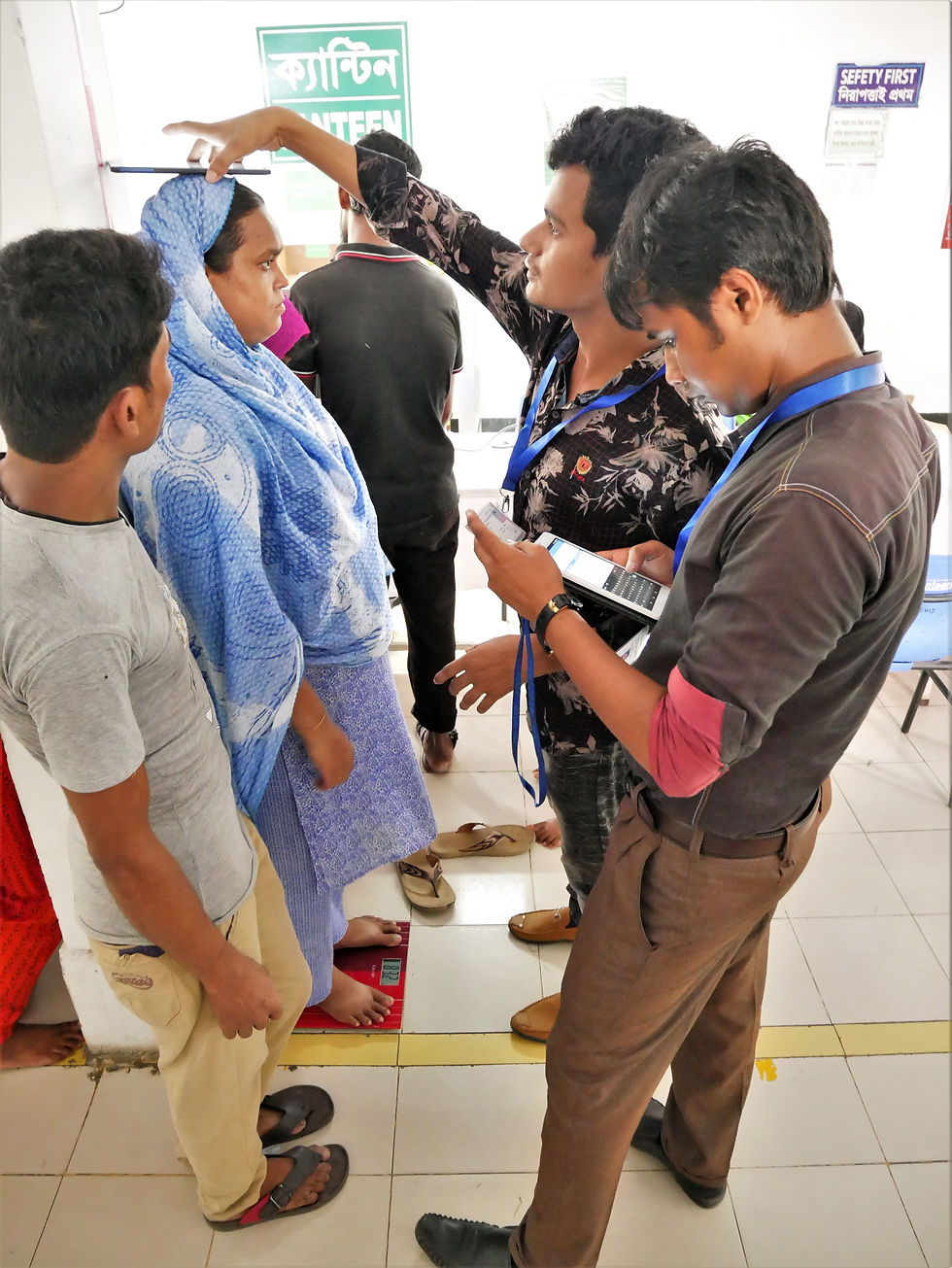A Day with HAEFA: Delivering Health Care to Garments Factory Workers in Dhaka
- Rodela A. Khan
- Jan 13, 2021
- 4 min read
Updated: Dec 17, 2023
The queue grew longer and longer, eventually snaking out into the hallway: women in colorful, traditional Bangladeshi salwar-kameez dresses with their uniform green handkerchiefs on their heads, and men wearing casual cotton button-up shirts commonly produced in the very factory where they work. They are awaiting the imminent opening of that day’s free Health on Wheels clinic being hosted at a garments factory in the Hemayetpur area of Dhaka by Health and Education for All (HAEFA).
Health on Wheels is an on-site mobile health care delivery system developed HAEFA, a 501(c)3 nonprofit organization working in Bangladesh. HAEFA serves the unmet health needs of garment industry employees in Bangladesh, a sector that employs nearly 3 million workers across the country, of whom 70% are women. HAEFA has been providing services to these industrial workers, with a special emphasis on women’s health, since 2013.
During the early hours of that morning, all hands were on deck as the HAEFA team transferred their equipment and materials from their van to diligently set up the clinic that was being hosted in one of the canteens at the factory complex. The team is comprised of all health and medical professionals working on a volunteer basis to help their clients lead self-sufficient and more productive lives though basic health service provision.

Within a short time of the clinic doors opening, a growing buzz of people and vibrant discussions took over the room. Smaller lines formed at the various consultation stations the space had been organized into. When HAEFA is welcomed on-site to a factory or worksite, all workers are screened and any necessary treatments are started. HAEFA typically completes a clinical round for follow up of the workers diagnosed with chronic diseases (hypertension, diabetes, asthma, tuberculosis, complications of pregnancy, cervical cancer, etc.) at each of the partner garment factories on a monthly basis.

The process begins at the busy patient intake table set up at the entrance of the canteen. The HAEFA staff utilize sophisticated m-Health tools such as secured tablets and a novel electronic medical record (EMR) software called NIROG (a Bangla word meaning ‘good health’) to facilitate the intake, coordinate screening test results, diagnosis, and treatment regime with its physicians. Once a worker visits the clinic, they are registered into the system and their medical history is recorded using the information from their factory identification card. They are then directed to the height and weight measurement station to input this basic data in their medical record. Each worker receives a health card and unique ID number linked to their confidential electronic medical record, enabling the healthcare team to continue ongoing follow up appointments, treatments and monitoring, using the latest cell phone-based software and technology.

Workers are first directed to the blood pressure and body temperature station administered by a nurse. Following this, those that were instructed at the previous month’s clinic to arrive on a 8-hour fast in preparation for diabetes screening, are motioned to a table where glucose tests are being administered. After their blood sugar level is tested, they are handed a small packet of cookies to break their fast.

HAEFA provides health screenings for common diseases, ongoing preventative care including health and feminine hygiene education, immunizations, and ante- and post-natal care. The clinic provides diagnosis and treatment for infectious diseases including diarrhea, typhoid, tuberculosis, and for chronic diseases such as asthma, diabetes, hypertension, heart failure.
At the final station, there are four doctors present who review all the patient’s information on their handheld tablets. They follow-up on all the notes thus far and reviewing everything that has been entered into the tablets by the nurses and paramedics at the previous stations. When the workers arrive at this last service station, they are able to engage in dialogue regarding any concerns from their perspective and the physician’s perspective regarding their health status. At this stage, any necessary medication is also given directly at no cost to the patient by the HAEFA doctors. Workers listen intently as the on-site doctors provide them evaluations, describing clearly to them what the results of their screenings were, and give instructions for at-home care.


Amidst the sea of workers energetically moving around from station to station during the six hours of the clinic, the HAEFA team works together seamlessly together. They provide high-quality health service to the hundreds of workers that are seen each month at various garment factory sites, with regular follow up appointments scheduled as necessary to improve their physical and mental health, and sustain their well-being. Their mission is to empower the underprivileged through preventive and curative health care.

Workers leave their clinic consultations to go back to their own factory stations on the production line – but they leave uplifted, armed with treatments and knowledge to improve their own health. HAEFA provides a crucial service to individuals, who are otherwise unable to receive care for a healthier life, right at their workplace.



With support from the Grands Défis Canada - Grand Challenges Canada, HAEFA provided over 30,000 screenings and treatments for garments factory workers between 2013 and 2020, Help HAEFA continue to provide essential health care services to garments factory workers in Bangladesh by donating here.

























ความคิดเห็น